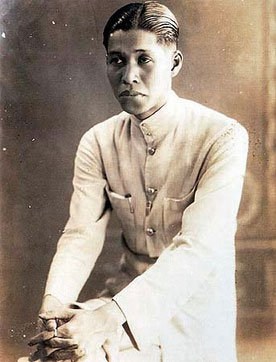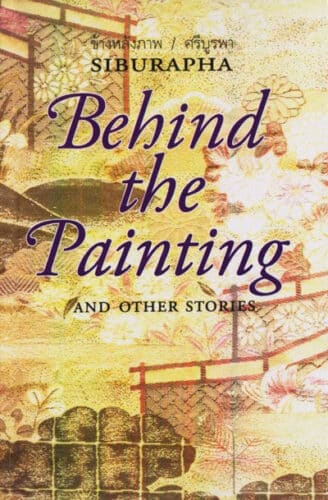
Kulap Saipradit (Photo: Wikipedia)
More information More information
"I die without anyone loving me, but I am satisfied that there is someone I love"
Last words Kirati writes to Nopphorn on her deathbed.
Behind the painting
'Behind the painting' was written by Siburapha (pen name of Kulaap Saipradit, 1905-1974) in the years just before the Second World War. Originally published in installments in a daily newspaper, it has since been reprinted as a book forty times and is one of the best-known and most beautiful novels in Thai literature. In 1985 and 2001 the story was filmed and in 2008 adapted into a musical starring Bie the Star.
The story begins with a look at a very ordinary painting depicting a mountain landscape in Mitake, Japan, with two small figures, a man and a woman, sitting on a rock. Nopphon then tells the story behind the painting in his own words.
Nopphorn falls under Kirati's spell
Nopphorn is a 22-year-old Thai student in Tokyo when he is asked to accompany a couple on a three-month honeymoon trip through Japan. Momrachawong [title of a great-grandchild of a king] Kirati, at the age of 35, married the equally aristocratic Chao Khun Athikaanbodi, fifteen years his senior.
From the first meeting, Nopphorn falls under the spell of the beautiful, charming and intelligent Kirati, and that love deepens and blossoms in their many encounters and conversations afterwards. During a hiking trip in Mitake Nature Park, he declares his love for her and kisses her passionately. Although she shares in the passion, she fends it off by appealing to her duty to her kind and considerate husband, whom she does not really love, by the way.
A few weeks later, the couple Kirati and Chao Khun return to Thailand. Nopphorn writes her passionate letters to which she replies with great warmth, showing her love without her ever saying it. Nopphorn's love fades, the correspondence falters. Chao Khun dies and Nopphorn writes Kirati a note of sympathy.
Kirati dies and Nopphorn finds a note with a declaration of love
After seven years in Japan, Nopphorn returns to Thailand where he marries Pari, his fiancé for seven years, chosen by his father. He makes some awkward visits to Kirati. A while later, Nopphorn is called to the deathbed of Kirati who, suffering from terminal tuberculosis, keeps mentioning Nopphorn's name in her feverish moments. When Kirati dies, Nopphorn finds a note with the text from the quote above.
Short biography of ศรีบูรพา (Siburapha, literally 'the Glorious East')
Born in 1905 in a poor family, he attended the famous school for rich people, Thepsirin, he wrote a number of books from 1928 and also went into journalism. For that work he traveled to Japan and Australia.
After the war, he founded the 'Peace Movement', which opposed the Korean War and nuclear weapons and also demanded the lifting of press censorship. He was a socialist and first opposed the royalists and later the military dictators like Phibun and Sarit.
In 1951 he visited the Isaan with a number of friends from the 'Peace Movement' to distribute food and blankets at Surin during a flood. On their return to Bangkok, he was arrested, along with a hundred other 'Communist ringleaders', and imprisoned for 5 years.
In 1958, Kulaap led a delegation to Beijing. When the other delegation members returned to Thailand, they were arrested and imprisoned. Kulaap decided to stay in China where he died in 1974. His son Surapan married Wanee, the daughter of Pridi Phanomyong.
Some passages from the book
A conversation between Nopphorn and Kirati in the garden of their hotel about Chao Khun, Kirati's husband.
(Nopphorn) ….'I've known him for a long time. He's a very nice man. That's why you must love him very much.'
Now it was Kirati's turn to be silent for a moment. "I like him the way children like a kind older man."
“You didn't say anything about love. I mean love between a husband and a wife, a man and a woman.'
“You have seen what I am and what Chao Khun is. There is a big difference in our ages. It is like a mountain that prevents love between us and prevents our love from being realized.'
"But love between an old man and a young woman is possible, isn't it?"
'I don't believe in love between two such people. I don't believe it's really possible unless we imagine it can be, and that could be a misconception.'
“But you are happy in your marriage. And yet you say that you do not meet in love.'
………'When a woman is reasonably satisfied she does not dwell on the problem of love. What more does she want as long as she is happy, with or without love…..Love can bring bitterness and pain in our life…..Do you want to know why I married him? That's a long story, too long for tonight.'
Later she tells why she married Chao Khun. She wanted to escape the oppressive aristocratic environment in which she was confined. Her marriage gave her a measure of freedom.
Nopphorn and Kirati are hiking in Mitake Nature Park. After the picnic, Kirati says:
….'I'm barely able to walk back.'
"I'll carry you," I said. I got up and put my arm around her body to support her. She declined my help in a soft voice, but I didn't listen. When she got up I held her arm, I was close to her. "Are you happy?" I asked.
'When I look at the stream down there I think we've climbed a long way. I wonder if I have the energy to go back.'
I moved closer to her so that our bodies almost touched. Kirati leaned against a cedar. I felt our hearts pounding violently.
"When we get home I'll make a drawing of two figures here," she said.
"I'm so lucky to be so close to you."
"And when are you going to let go of me so we can pack up?"
"I don't want to let you go." I pressed her body against me.
"Nopphorn, don't look at me like that." Her voice began to tremble. 'Let me go. I now feel strong enough to stand on my own two feet.'
I pressed my face against her soft rosy cheeks. I couldn't control myself anymore. I pulled her against me and kissed her passionately. For a moment I fell into oblivion.
Kirati broke free from my grasp and pushed me away from her. …. She leaned against the tree and was panting as if she had walked a long way and was tired. Her rosy cheeks were darker as if sunburnt.
"Nopphorn, you don't know what you just did to me," she said, her voice still trembling.
"I know I love you."
"Is it appropriate then that you express your love for me in this way?"
"I don't know what's appropriate, but love overwhelmed me and I almost lost my mind."
Kirati looked at me with a sad look in her eyes. 'Do you always express your love when you are out of your mind? Didn't you know there's nothing you regret later than the things you do when you're out of your mind?'
A few days later.
"We should never have met," Kirati said wistfully, more to herself than to me. "In the beginning it was so beautiful, but now it has turned into a torture."
Nopphorn's first letter.
“I almost went mad when the ship slowly faded into the distance and I could no longer see the beauty of your face. I almost passed out on the dock when I couldn't see your waving hand anymore…………I only now realize that awful truth that although I asked you many times, you never said whether you loved me or not. I know your silence didn't mean you rejected my love. I so wanted you to say it plainly. If you would just tell me that you love me it would be the greatest happiness of my life. Can you grant my wish, I beg you?'
Kirati's first reply by letter.
"If you still haven't cooled down then I must advise you to write your letters in a fridge or outside when it snows."
Nopphorn's second visit to Kirati in Bangkok.
"Kirati, I have something to tell you."
"I hope it's good news. It must have something to do with the progress in your work.' She waited with interest for my answer.
'No. It's good news, but it has nothing to do with my work. I'm sure you'll be pleased to hear that I'm getting married soon.' She looked somewhat shocked, as if she hadn't expected this news.
'Are you getting married?' she repeated uncertainly. "It's the lady you were waiting for in Bangkok, isn't it?"
"Oh, did you already know, then?"
'No, I had no idea. I just guessed. Have you known each other for a long time?'
"She's my betrothed."
'Since when?' Kirati's face expressed doubt instead of glowing with happiness.
'Seven or eight years. Just before I left for Japan.'
"But all the time I was with you in Tokyo, you never said a word to me about a betrothed."
 On her deathbed, Kirati gives the painting Mitake to Nopphorn.
On her deathbed, Kirati gives the painting Mitake to Nopphorn.
"Do you remember what happened there, Nopphorn?"
"I fell in love there," I replied.
"We fell in love there, Nopphorn," she said, closing her eyes. 'You fell in love there and your love died there. But with someone else that love still lives in an emaciated body.' Tears drip from behind her closed eyelids. Kirati sat still in exhaustion. I looked at that body with love and sorrow………
Kirati died a week later. I was with her in those dark hours, along with her friends and close relatives. Just before the end she asked for pen and paper. She wanted to say something but her voice refused and so she wrote: More information "I die without anyone loving me, but I am satisfied that there is someone I love"
ศรีบูรพา, ข้างหลังภาพ, ๒๕๓๗
Siburapha, Behind the painting, Silkworm Books, 2000
– Reposted message –


A beautiful story, painful that two people who love each other are more or less forced by society not to imitate it. While love is the most beautiful thing on this earth.
Only the paragraph about the writer Siburapha/Kulaap I had to read a second time. It interrupted the story and that was confusing.
A beautiful story that will stay in my memory for a long time.
I will talk about it with my Love, think about it…
Those who Google videos for “ข้างหลังภาพ (2001)” can find short clips or even the entire film online. Unfortunately without English subtitles. On YouTube I also came across a Thai-language e-book.
As for the emotional note at the end, it sounds less in Dutch than in Thai. For example, because Dutch has no formal versus informal, or more versus less intimate word for “I”. For example, ฉัน (chán/chǎn) is an informal and feminine/intimate word for “I”. And also อิ่มใจ, literally a “full heart, satisfied heart” loses something when converted into Dutch (content, satisfied, satisfied).
Thai: ฉันตายโดยปราศจากคนที่รักฉัน แต่ฉันก็อิ่ม More information
Phonetic: chán taay dooy praat-sà-laak khon thíe-rak chán. Tàe chán kô ìm-tjai wâa chán mie: khon thîe: chán rák.
Literally: I(informal feminine/intimate), dead/dying, through/through, without (/to be denied), person, lover, me. But, I, nevertheless, have a full heart (be glad, be satisfied), that, I, have a person whom I love.
English: I die without anyone to love me, but I am happy that there is someone I love.
It is a story of two hearts that never became lovers due to circumstances as well as differences in age and position/class.
Here are the links to the movie 'Behind the painting': I thought it was a nice movie to watch.
Part 1 https://www.dailymotion.com/video/x7oowsk
Part 2 https://www.dailymotion.com/video/x7ooxs1